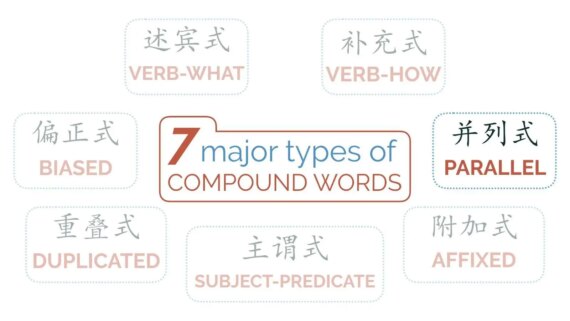How to Say No In Chinese: 12 Ways

You may be surprised that your tutor, or whoever is helping you learn Mandarin, might not teach you how to say “no” in Chinese right away. This is because there is no Chinese equivalent to the English words “yes” or “no,” unlike in most other languages.
So how do you deny or negate something in Mandarin? That depends on the situation and the question you are answering. In English, we combine “no” with different words to give a negative answer—saying, “No, I don’t,” “No, there isn’t,” or “No, I can’t.” You can do the same to say no in Chinese, offering a negative answer by saying “don’t want,” “is not,” or “can’t.”
Does this mean there are many different ways to say no in Chinese in different situations or questions? Is it that complicated? Not quite. Once you learn the basic patterns and understand how the language works, you’ll be able to refuse, disagree, or decline just as native speakers do. So read on to learn how to say no in Chinese.
1. 不是 / 不是的 – Bùshì / bùshìde
Look up the word “no” in the dictionary of the Mandarin Chinese language, and you’ll find a confusing array of negative particles, all of which might be translated as “no” or “not.” Few, if any, of these are used by themselves. In daily life, two main characters are used in combination with other characters or words to say no in Chinese: 不 bù and 没 méi.
是 shì is the Chinese verb “to be,” corresponding to the English words “is,” “am,” or “are” in most cases. For example, in the sentences 我是美国人 Wǒ shì měiguórén (“I am American”), 那支笔是红色的 Nàzhī bǐ shì hóngsède (“That pen is red”) and 他们是大学生 Tāmen shì dàxuéshēng (“They are university students.”)
不是 bùshì is the negative form, used to say “is not,” “am not,” or “are not.” For example, in the sentences: 她不是英国人 Tā bùshì yīngguórén (“She is not British”), 我不是有钱人 Wǒ bùshì yǒuqiánrén (“I am not rich”), 那些蘑菇不是有毒的 Nàxiē mógū bùshì yǒudúde (“Those mushrooms are not poisonous”).
When followed by another character with a fourth (falling) tone, 不 has a tone change to the second (rising) tone. Though the pinyin is usually written “bù shì” (falling-falling), the phrase 不是 should be pronounced “bú shì” (rising-falling). The same applies whenever 不 bù is followed by another character pronounced with a fourth (falling) tone.
You can use 不是 bùshì or 不是的 bùshìde to give a negative answer to questions using 是 shì, questions like “Is this…?”, “Are you..?”, or “Are they…?” An example sentence or two should help to make this clear:
你是老师吗?
Nǐ shì lǎoshī ma?
Are you a teacher?
不是, 我是医生.
Bùshì, wǒ shì yīshēng.
No, I’m a doctor.
他是不是韩国人?
Tā shìbùshì hánguórén?
Is he Korean?
不是的,他是日本人.
Bùshìde, tā shì rìběnrén.
No, he isn’t. He’s Japanese.
Those teaching Chinese may tell you that 不是的 bùshìde is slightly more formal than 不是 bùshì, but in real life, you can use the two phrases interchangeably.
You may sometimes hear native speakers use 不是 to respond to questions that do not contain 是, as in the following example:
你想去加拿大吗?
Nǐ xiǎng qù jiānádà ma?
Do you want to go to Canada?
不是,我想去美国.
Bùshì, wǒ xiǎng qù měiguó.
No, I want to go to America.
While not incorrect, the nuance here is somewhat different. 不是 bùshì does not mean “No, I don’t want to go (to Canada),” but rather “No, that’s wrong.”

2. 没有 – Méiyǒu
没有 méiyǒu is made up of 没 méi, which means “not,” and 有 yǒu, a verb meaning “to have.” The literal translation of 没有 méiyǒu is “not have” or “don’t have.” After 不是 bùshì, it’s the most common way to say no in Chinese. You can respond with 没有 when you want to tell someone you don’t have something, for example:
你有没有车?
Nǐ yǒuméiyǒu chē?
Do you have a car?
我没有.
Wǒ méiyǒu.
No, I don’t.
You can also use 没有 méiyǒu to say “there isn’t” or “there aren’t,” as in the following example:
这附近有没有银行?
Zhè fùjìn yǒuméiyǒu yínháng?
Is there a bank near here?
没有.
Méiyǒu.
No, there isn’t.
You can use 没有 méiyǒu when you want to talk about something that hasn’t happened yet or something you haven’t yet done, as in the following examples:
你去过北京吗?
Nǐ qùguò běijīng ma?
Have you (ever) been to Beijing?
没有.
Méiyǒu.
No, I haven’t.
你的作业做完了吗?
Nǐde zuòyè zuòwánle ma?
Have you finished your homework yet?
还没有.
Hái méiyǒu.
Not yet.
3. 不对 – Bùduì
对 duì means “right” or “correct,” so 不对 bùduì means literally “incorrect,” or “wrong.”
In the Chinese language, you use 不对 bùduì when you want to disagree with someone’s opinion or say that their statement is wrong. For example:
自由女神像在华盛顿.
Zìyóunǚshénxiàng zài huáshèngdùn.
The Statue of Liberty is in Washington.
不对,自由女神像在纽约.
Bùduì, zìyóunǚshénxiàng zài niǔyuē.
No, the Statue of Liberty is in New York.
When someone in China wants to confirm their facts, they may say 对不对 duìbùduì. This literally means “right or wrong” or “is that correct?” but is more naturally translated into English as “right?” or “Isn’t it?” On these occasions, 不对 bùduì is the most natural response. For example:
明天的会议是下午两点,对不对?
Míngtiānde huìyì shì xiàwǔ liǎngdiǎn, duìbùduì?
Tomorrow’s meeting is at 2 pm, right?
不对,明天的会议是下午三点.
Bùduì, míngtiānde huìyì shì xiàwǔ sāndiǎn.
No, tomorrow’s meeting is at three o’clock.
It is also acceptable to use 不是 bùshì in such cases, as in the following sentence:
不是,明天的会议是下午三点.
Bùshì, míngtiānde huìyì shì xiàwǔ sāndiǎn.
No, tomorrow’s meeting is at three o’clock.
The usual tone rule applies: as 对 duì also has a falling tone, 不 bù will change from the fourth tone (falling) to the second tone (rising). So 不对 is pronounced “bú duì” and not “bù duì,” as it is usually written in pinyin. You will want to practice pronouncing these phrases in the correct tone.

4. 不行 – Bùxíng
行 xíng is one of those Chinese characters that sometimes mean almost anything the speaker wants. The popular Mandarin dictionary app Pleco lists 19 separate definitions ranging from “travel” to “temporary,” “conduct” to “capable,” “effective” to “all right.”
In response to a question, the negative form 不行 bùxíng translates variously into English as “not allowed,” “no good,” “impossible,” or simply, “no,” depending on context. Let’s look at some examples to see how this works:
你能借我一百元吗?
Nǐ néng jiè wǒ yībǎi yuán ma?
Can you lend me 100 RMB?
不行.
Bùxíng.
No way.
你能在明天之前完成这篇文章吗?
Nǐ néng zài míngtiān zhīqián wánchéng zhèpiān wénzhāng ma?
Can you finish this article by tomorrow?
不行.
Bùxíng.
Impossible.
这里可以停车吗?
Zhèlǐ kěyǐ tíngchē ma?
Is it okay to park here?
不行.
Bùxíng.
No. (It’s not allowed).
If someone answers “不行” bùxíng without giving a reason or excuse, it can sound rude. On the other hand, it may be acceptable when talking to a friend or colleague. Still, when speaking with a stranger, or someone in a position of authority, you should make your refusal a little more indirect.
If you want to decline an invitation more politely, it’s best to give a gentle excuse and say “not this time” in Chinese, leaving the opportunity open for another occasion.
5. 不可以 / 不能 – Bùkěyǐ / bùnéng
可以 kěyǐ is one of three common phrases—along with 会 huì and 能 néng—usually translated into English as “can.” Though the three phrases overlap to a certain degree, 可以 kěyǐ is not used when talking about ability (“Can you play the piano?”). Instead, it is more often used to ask for permission (“Can I take your photo?”) or to make a request (“Could you pass me the salt?”).
The literal meaning of the phrase 不可以 bùkěyǐ, then, is “cannot” or “may not.” It functions much the same as in English:
我可以在这里抽烟吗?
Wǒ kěyǐ zài zhèlǐ chōuyān ma?
Can I smoke here?
不可以.
Bùkěyǐ.
No, you can’t.
老师,我可以去洗手间吗?
Lǎoshī, wǒ kěyǐ qù xǐshǒujiān ma?
不能.
Bùnéng.
When used in this way, 可以 kěyǐ and 能 néng are more-or-less interchangeable, but 能 néng also carries the meaning “able to.” Thus, the sentence 我能去洗手间吗? Wǒ néng qù xǐshǒujiān ma? might mean either “May I go to the toilet?” (requesting permission) or “Am I able to go to the toilet?” (wondering whether you can move your bowels—perhaps you have been constipated the past two days or so!)
When you are first beginning to learn Chinese, the various ways of expressing “can” in the Chinese language can be challenging. The meanings overlap so much it can be difficult to prise them apart. When in doubt, it’s better to stick with 可以 kěyǐ when asking for permission, to avoid any misunderstandings!
Remember that it can sound a little rude in the Chinese language to say no so directly. Therefore, when speaking with a stranger or superior, it’s better to offer a reason or excuse when you refuse.

6. 不会 – Búhuì
If you want to talk about what you can do in Chinese, meaning those things you have learned how to do, 会 huì is the word to use. 会 huì is the Chinese word that most directly corresponds to the English word “can.” Therefore, you can use the phrase 不会 bùhuì to say you can’t do something, for example:
我会弹吉他.
Wǒ huì tán jítā.
I can play the guitar.
我妹妹不会游泳.
Wǒ mèimei bùhuì yóuyǒng.
My little sister can’t swim.
Unsurprisingly then, 不会 bùhuì is commonly used when giving negative answers to questions regarding your skills and abilities, or responding to “Can you?” questions, as in the example below:
你会说中文吗?
Nǐ huì shuō zhōngwén ma?
Can you speak Chinese?
不会.
Bùhuì.
No, I can’t.
Once more, the correct pronunciation of 不会 here is “bú huì,” and not “bù huì” as the pinyin would indicate.
Somewhat confusingly, though 会 huì literally means “can,” it is also used to refer to things that are going to happen, equivalent to the English word “will.” So you combine 会 huì with a verb or adjective to make a statement about something that will happen in the future, as in the following sentence:
看天气预报说,今天会下雨.
Kàn tiānqì yùbào shuō, jīntiān huì xiàyǔ.
According to the weather report, it’s going to rain today.
In the same way, you can use 不会 bùhuì to express something that is not going to happen, or to give a negative answer to a question about the future:
你觉得今天会很热吗?
Nǐ juédé jīntiān huì hěn rè ma?
Do you think it will be hot today?
不会, 看起来会下雨.
Bùhuì, kànqǐlái huì xiàyǔ.
No, it looks like it’s going to rain.
7. 不可能 – Bùkěnéng
In Mandarin, 可能 kěnéng is both an adjective and an adverb, with the literal meaning “possible,” “maybe,” or “possibly.” When you need to give a firm negative answer, you can use the negative form 不可能 bùkěnéng, the literal meaning of which is “impossible.” Using 不可能 bùkěnéng to answer no in the Chinese language is a little like saying “no way” in English, and it can sound very harsh. If you’re looking for a polite way to refuse someone’s offer, this is absolutely NOT the phrase to use:
妈妈,我明天可以借你的车吗?
Māmā, wǒ míngtiān kěyǐ jiè nǐde chē ma?
Mother, can I borrow your car tomorrow?
不可能! 上次你把车刮坏了.
Bùkěnéng! Shàngcì nǐ bǎ chē guāhuàile.
No way! You scratched the car last time.
Using 不可能 bùkěnéng when declining an invitation or request is a sign that you consider the request entirely inappropriate. The other person is sure to feel dejected or offended if you refuse them so directly–just imagine how you would feel
小红,做我女朋友好吗?
Xiǎo Hóng, zuò wǒ nǚpéngyǒu hǎo ma?
Xiao Hong, will you be my girlfriend?
不可能! 我根本就不喜欢你.
Bùkěnéng!Wǒ gēnběn jiù bùxǐhuān nǐ.
No way! I don’t even like you.
You can also use 不可能 bùkěnéng to talk about the future. Here, 不可能 bùkěnéng functions much like 不会 bùhuì, but expresses a greater degree of impossibility:
你觉得今天会很热吗?
Nǐ juédé jīntiān huì hěn rè ma?
Do you think it will be hot today?
不可能, 看起来会下雨.
Bùkěnéng, kànqǐlái huì xiàyǔ.
No way. It looks like it’s going to rain.

8. 没门儿 – Méiménr
The literal meaning of 没门儿 méimén er is “no door” or “there is no door.” A better explanation in English might be “no doors are open” or “all doors are closed.”
Though 不可能 bùkěnéng and 没门儿 méiménr both mean “impossible,” or “no way,” the usage is somewhat different. You cannot use 没门儿 méiménr to express a negative fact (“There’s no way it’s going to rain today”). Instead, 没门儿 méiménr is used to communicate that you have no way of doing something, or that there is no way you are going to agree. It can sound very straightforward. For example:
你能帮我们弄到Black Pink 演唱会的门票吗?
Nǐ néng bāng wǒmen nòngdào Black Pink yǎnchànghuìde ménpiào ma?
Can you get us tickets for the Black Pink concert?
我可没门儿.
Wǒ kě méiménr.
You’re asking the wrong person.
没门儿 méiménr is a very colloquial phrase used in spoken Mandarin Chinese and pronounced with the extended “ér” sound at the end. This ér-sound is commonly added to certain words in northern dialects of Chinese, in an interesting practice known as erization, or “Ér huà.”
Unlike the other ways to say no in the Chinese language explored in this article, 没门儿 méiménr is a slang term and should be used with caution.
9. 不用 / 不用了 – Bùyòng / bùyòngle
The phrase 不用 bùyòng means “no use” or “no need,” but the literal meaning has little to do with how it is used in Chinese. In Mandarin, 不用 bùyòng is a good way of refusing someone’s offer of help. If you want to know how to say “no, thank you” in Chinese, 不用 bùyòng is the most convenient phrase to use. For example:
你需要帮忙吗?
Nǐ xūyào bāngmáng ma?
Do you need any help?
不用了.
Bùyòngle.
No, thanks.
The usual tone rule applies here. 不用 is pronounced “bú yòng” and not “bù yòng” as the pinyin would indicate.

10. Negating verbs and adjectives with 不 bù
You can use the 不 + verb structure to respond negatively to questions about your likes and dislikes or to express an opinion. While this simple rule does not apply in all cases, it is useful to remember: repeat the verb in the question and place 不 in front. For example:
你喜欢狗吗?
Nǐ xǐhuān gǒu ma?
Do you like dogs?
不喜欢, 我有点儿怕狗.
Bùxǐhuān, wǒ yǒudiǎn’r pà gǒu.
No, I don’t. I’m a little afraid of dogs.
你认为他们会结婚吗?
Nǐ rènwéi tāmen huì jiéhūn ma?
Do you think they will get married?
我不认为.
Wǒ bùrènwéi.
I don’t think so.
As there is no future tense in the Chinese language, you can use the present tense to talk about the future. Though the literal meaning of the 不 + verb structure is akin to “don’t [verb]” in English, it is also used to say “won’t [verb],” or to decline an offer, as follows:
你喝咖啡吗?
Nǐ hē kāfēi ma?
Do you drink coffee?
我不喝.
Wǒ bùhē.
No, I don’t.
你喝咖啡吗?
Nǐ hē kāfēi ma?
Do you want a coffee?
不用了,我不喝.
Bùyòngle, wǒ bùhē.
No, thank you.
下个月你去上海吗?
Xiàgèyuè nǐ qù shànghǎi ma?
Will you go to Shanghai next month?
我不去.
Wǒ bùqù.
No, I won’t.
Unless the person speaking indicates a specific time (“下个月” xiàgèyuè), there is no way to be certain of the meaning without asking for clarification. It depends entirely on the context.
You can also combine 不 with adjectives to give a negative answer in the same way. In this case, it refers to the present:
你热不热?
Nǐ rèbùrè?
Are you hot?
不热.
Bùrè.
No, I’m not.
你生我的气吗?
Nǐ shēng wǒde qì ma?
Are you angry with me?
我不生气.
Wǒ bùshēngqì.
No, I’m not.
Whichever word you negate, the usual tone change rules apply. For example, the pronunciation will change when 不 bù is followed by another fourth tone. In that case, it should be pronounced with a second (rising) tone, no matter how it is written in pinyin.
11. Negating verbs with 没 méi
You can use the 没 + verb structure to respond negatively to questions about the past. It’s a convenient way to communicate that you did not do something or haven’t done it yet. To apply this simple rule, restate the verb in the question, and place 没 in front. For example:
你洗车了吗?
Nǐ xǐchēle ma?
Did you wash the car?
还没洗.
Háiméixǐ.
Not yet.
你吃过臭豆腐吗?
Nǐ chīguò chòudòufu ma?
Have you ever eaten stinky tofu?
没吃过.
Méichīguò.
No, I haven’t.

12. 勿 – Wù
Of the many ways to say no in Chinese, 勿 wù, meaning “no” or “don’t,” is one of the most formal. In China, you will often see it on signs. However, if you listen, you might also hear it in public announcements, such as those in the cinema or theatre:
请勿抽烟.
Qǐng wù chōuyān.
No smoking.
请勿扔垃圾
Qǐng wù rēng lājī.
No littering.
Though rarely used in daily speech, its usage is not entirely relegated to formal writing. For example, imagine someone has just lit up a cigarette in the elevator of your apartment block— a not uncommon experience in some parts of China. As the elevator door opens and you emerge on the ground floor, the security guard (if he is very polite) might say to the person:
请勿抽烟.
Qǐng wù chōuyān.
Please, don’t smoke.
Unlike most other languages, the Chinese language has no word or phrase with the literal meaning “no.” As a result, it may take some time to learn how to say no in Mandarin relevant to each situation. To get to grips with saying “no” or saying “no, thanks” in Chinese, you need to watch and listen to how native speakers give a negative or positive answer, depending on the circumstances.
You can listen to our podcast to get more insights on how to say “no” in different situations.
Learning to say no in Chinese will take some getting used to, but we promise it will get easier in time! 加油 Jiāyóu!








